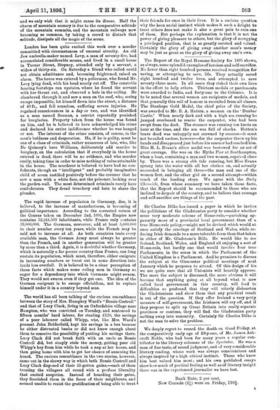London has been quite excited this week over a murder
committed with circumstances of unusual atrocity. An old Jew umbrella-maker named Levy, a man of seventy-five, had -accumulated considerable means, and lived in a small house in Turner Street, Stepney, attended only by a servant, a widow of thirty-six. On Saturday a friend who called could -not obtain admittance and, becoming frightened, raised an alarm. The house was entered by a policeman, who found Mr. Levy lying dead, with his head nearly cut off. The constable hearing footsteps ran upstairs, where he found the servant -with her throat cut, and observed a hole in the ceiling. He clambered through it and saw a man on the roof, who, seeing escape impossible, let himself down into the street, a distance of 40 ft., and fell senseless, suffering severe injuries. He regained consciousness in a day or two, and was identified -as a man named Seaman, a convict repeatedly punished -for burglaries. Property taken from the house was found -on him, and he is believed to have acknowledged his crime and declared his entire indifference whether he was hanged -or not. The interest of the crime consists, of course, in the man's boldness and desperation. He, if he is guilty, must be one of a class of criminals, rather numerous of late, who, like De Quincey's hero Williams, deliberately add murder to burglary, on the calculation that if everybody in the house -entered is dead, there will be no evidence, and who murder coolly, taking time in order to miss nothing of value attainable in the house. The murderer is believed to have had no con- federate, though an " intelligent " and probably imaginative child of seven testified positively before the coroner that he saw a man with a white face, not the prisoner, looking over the garden-wall. The most determined criminals rarely have confederates. They dread treachery and hate to share the plunder.


































 Previous page
Previous page